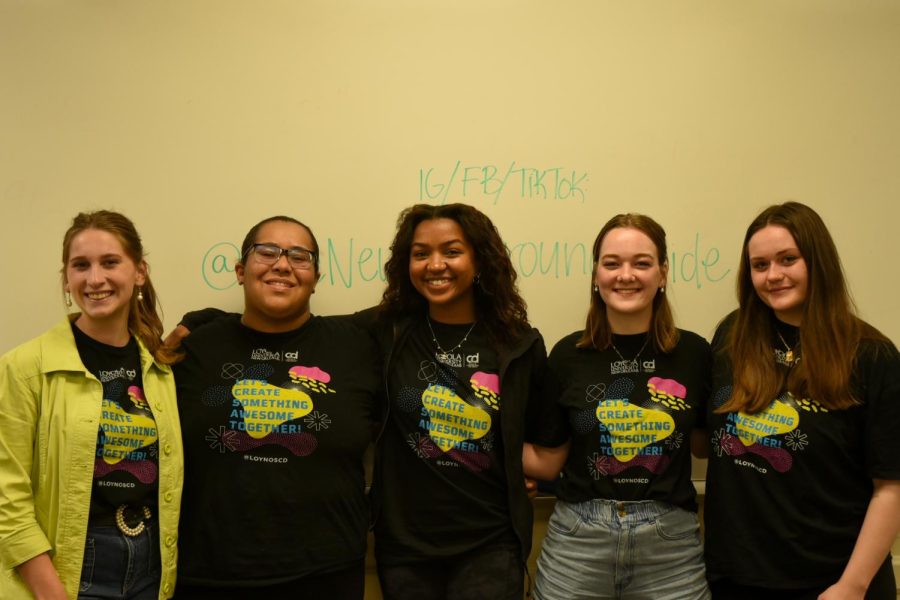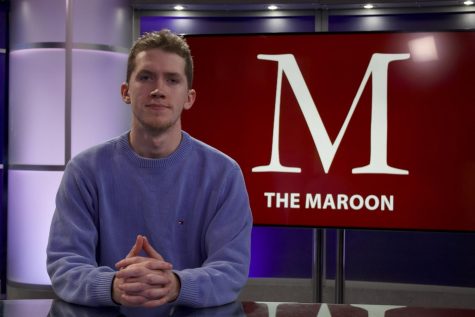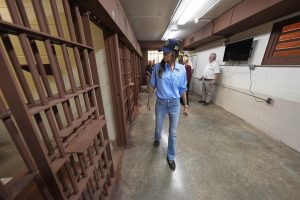Students fight for news literacy
The 2023 Bateman team (from left to right), Anna Hummel, Julia Bueno, Aja Cousins, Alexis Parrino and Sophie Bornefeld. pose for a photo after Media and politics event on Thursday, March 2. The Neutral Ground Side campaign hosted events across campus educating students about news literacy.
March 11, 2023
Students from Loyola’s Bateman team are wrapping up a year-long campaign in which they have been fighting disinformation and educating students across campus about the importance of news literacy.
Every semester the Bateman team goes head-to-head in a national competition with schools across the country to promote a predetermined campaign through unique, tactful, and clever strategies that will make the largest impact in their communities. The competition’s sponsor will then use the strategies from the most successful campaigns to support their own missions. This year the News Literacy Campaign, a non-profit, nonpartisan organization focused on educating students on real news, was the competition’s sponsor.
Alexis Parrino, a public relations junior who was part of the campaign this year, said the team started working on the campaign in November, working through the holidays, Thanksgiving, Christmas, and Mardi Gras, to ensure their campaign is something they could be proud of.
“Our team has been working to host educational and fun events, posting on various social media platforms with helpful infographics, interviewing industry professionals, researching topics about and related to misinformation, and tabling to help spread awareness,” Parrino said.
Loyola’s Bateman team plans to submit their own plan book to the News Literacy Project, containing the team’s most successful strategies and ideas, according to Parrino.
“The effects of disinformation on students are bigger than we think. Students are the ones that will keep the world turning in the future and if they aren’t able to differentiate what is true from what is fake, it can create chaos,” said mass communication sophomore Julia Bueno, who is also working on the campaign.
Bueno said it’s important for students to know how they can find credible sources and avoid those that aren’t. Otherwise, she said, it will become difficult to distinguish opinion from fact.
And fake news has been on the rise. The amount of fake news identified by independent fact-checkers from 2019 to 2020 almost doubled. And in 2022, disinformation efforts pushing anti-vaccination falsehoods, election fraud allegations, and economic conspiracies about inflation and gas prices gained enormous traction.
“Teens and adults need to be aware of how bad things can get if we start trusting any sources we find. It will destroy our democracy and increase problems amongst those who believe it and spread it,” Bueno said.
Political science professor Sean Cain gave a presentation about the importance of news literacy at one of the Bateman team’s events and discussed the important role news-literate students have in protecting democratic institutions.
“Non-engagement reduces accountability for the people in political power. When the news media fails to keep tabs on those in power, and when citizens are unable or unwilling to try to do so too, the government can become unresponsive to the problems people face or, worse, become corrupt,” Cain said.
Junior public relations major Sophie Bornefeld also worked on the campaign this year. She said young adults have a responsibility to fact-check their information before circulating it among their friends and family. Likewise, she said it’s just as important to understand the information and consider it from every angle before we formulate our opinions.
And Cain agrees. He said students becoming informed about local issues and being open to sharing their knowledge with friends, family, and neighbors is a form of community service.
Studies show that Americans have more trust in local news organizations than in national media corporations. But news literate citizens must fight even harder to get relevant, local information as news media companies struggle to survive financially. In Louisiana, newspaper circulation decreased by 40% between 2004 and 2019.
As a result, the number of so-called “news deserts” – communities with limited access to credible, comprehensive news and information that feeds democracy at the grassroots level – has rapidly increased.
Cain explained the growing distrust in the media through three sets of data from General Social Surveys and Gallup which demonstrated a trend of low trust in government, low trust in mass media, and low trust in others. The lack of trust indicates a pattern of people withdrawing confidence in public institutions.
“The gap in political awareness, or news literacy, accelerates the partisan polarization in the national government because elected officials care more about the concerns of those citizens who are most aware of what they do than they do about those who are less regularly informed about the government,” Cain said.
However, the ever-changing news market has presented an opportunity for groups like the Bateman team to educate larger audiences and fight misinformation by innovating clever, new digital communication strategies.
“I think that our campaign is making a difference and encouraging students to fact-check any information they see. We have worked so hard to get our information out and make a real impact on the student body,” Parrino said. “No one wants to be misinformed when having a serious discussion on important topics, so I think this matter is important to everyone. Overall, I think Loyola students care about being news literate, just as much as we, the Bateman team, do.”








